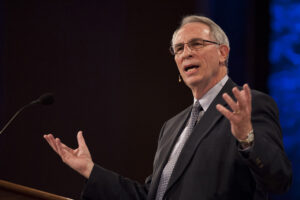
WASHINGTON (BP) — Saudi Arabia won a seat on the U.N. Human Rights Council this fall although the iron-fisted kingdom has shown little appetite for actual human rights.
Writing for the National Review, Nina Shea and Darara Gubo reported on a campaign of murder, rape and imprisonment against undocumented African and Asian migrants. Since the state began its early November round-up, at least 10 Ethiopians were killed and over a dozen raped, according to Shea, director of the Hudson Institute’s Center for Religious Freedom and a former member of the U.S. Commission on International Religious Freedom, and Gubo, a human rights scholar in Atlanta.
“This harsh crackdown bears the hallmarks of Saudi religious and racial bigotry,” Shea and Gubo wrote.
Among other countries elected to the 47-nation U.N. council on Nov. 12 were China, Cuba, Russia, Algeria, Morocco and Vietnam. One-third of the council’s members are elected each year for three-year terms.
Peggy Hicks of Human Rights Watch noted to Reuters news service, “With the return of China, Russia, Saudi Arabia and Cuba, human rights defenders will have their work cut out for them…. Fortunately, no states have a veto in Geneva so a hard-working majority can still achieve concrete results.”
In Saudi Arabia, according to reports by The Wall Street Journal, authorities came to a neighborhood in the capital city of Riyadh and declared that all illegal African migrants had to leave immediately. Pakistani laborers tried to help police by catching African migrants themselves, and violent clashes began.
But Shea and Gubo reported that the government’s crackdown, assisted by vigilante mobs, seems to have gone beyond illegal immigrants. They pointed to a YouTube video showing graphic violence against people simply because of their national origin.
“In it, mobs brutally attack Ethiopian immigrants, several of whom are then pictured dead and injured,” Shea and Gubo wrote.
The Saudi government’s crackdown against illegal immigrants is aimed at freeing up work for Saudi nationals, Shea and Gubo wrote. It began last January but was suspended until early November to give workers time to obtain permits. However, even immigrants legally working in the country lack basic rights and face abuses such as sexual violence and slave-like conditions.
A May 2013 report by Amnesty International said migrant workers can face long hours, non-payment of wages, refusal of permission to return home after completing a contract, withholding of passports, and physical abuse. Workers who take legal action against abusive employers can find themselves in court cases that last for years.
Shea and Gubo highlighted the example of L P Ariyawathie, a Sri Lankan domestic worker featured in the Amnesty report. When she returned to Sri Lanka, she was found with 24 nails and a needle lodged in her hands, leg and forehead.
“She said that the injuries had been inflicted by her employer when she complained about her heavy workload,” Amnesty reported. “It is unclear whether the Saudi Arabian authorities investigated the matter.”
The Saudi government also has taken fire for its restrictions on free speech, especially prosecutions for “apostasy” and “blasphemy.”
According to a report by the United States Commission on International Religious Freedom, 24-year-old Saudi blogger Hamza Kashgari fled the kingdom to Malaysia in February 2012 amid possible apostasy and blasphemy charges for Twitter comments. Deported back to Saudi Arabia after a few days, Kashgari languished in detention for two years without charges before his release on Oct. 29.
USCIRF also reported that in June 2012, Saudi officials arrested Raif Badawi, editor of the Free Saudi Liberals website, for apostasy, “insulting Islam through electronic channels” and “going beyond the realm of obedience.” While a court decided not to pursue the apostasy charge, the other charges remain, and Badawi is still in detention.
During USCIRF’s visit to Saudi Arabia in February 2013, Saudi officials said free speech is limited in the kingdom with regard to Islam, the prophet Muhammad, and speech that transgresses “moral values.” One official said Saudi media entities are not allowed to offend the feelings of individual members of the government.
Women also face significant obstacles in Saudi Arabia, according to USCIRF. Women cannot obtain medical care or travel without the permission of a male relative and are not allowed to drive motor vehicles. In court, a woman’s testimony counts for one-half of a man’s, and a man may divorce his wife for any reason, while a woman must demonstrate legally-specified grounds for a divorce.
The USCIRF report also highlighted the Saudi government’s hostility toward other religions. No non-Muslim places of worship are allowed, and the government limits Muslim worship to its official version of Sunni Islam. In March 2012, Saudi Grand Mufti Abdulaziz Al al-Sheikh told Arabic media it is “necessary to destroy all the churches of the region” in response to a Kuwaiti delegation asking him if churches should be outlawed in Kuwait.
Christians and adherents of other non-Muslim religions are technically allowed to worship in private homes, although Saudi security forces have raided some gatherings, claiming non-religious reasons for the raids.
Despite what USCIRF called “improvements” in religious freedom such as progress on countering extremist Muslim ideology and promoting a “culture of dialogue”, USCIRF still lists Saudi Arabia as a “country of particular concern” for its severe restriction of all non-Muslim religions, its promotion of its official brand of Islam, and its continued arrest of individuals for religious offenses.
–30–
Compiled by John Evans, a writer in Houston, and Baptist Press editor Art Toalston. Get Baptist Press headlines and breaking news on Twitter (@BaptistPress), Facebook (Facebook.com/BaptistPress ) and in your email ( baptistpress.com/SubscribeBP.asp).















